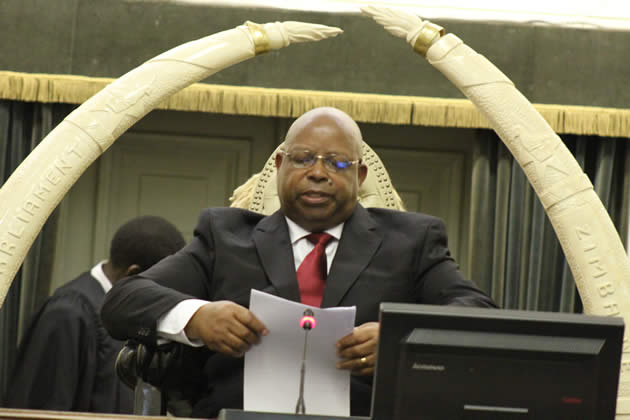A level of education requisite for MPs

Lloyd Gumbo Mr Speaker, Sir
“IF you fail academically, then be a Member of Parliament — the only profession where academic qualifications don’t matter,” said one of the readers in response to one of the instalments on this column.
Constitutionally, parliamentarians control our destiny as a country through the laws they make.
After all, some of the laws require astute minds especially on regional and international protocols that our country may ratify.
Some of our MPs, we are told, won political party primaries because they could sing at rallies while others made it for being brave and daring rank marshals.
But they made it into Parliament where they talk loudly and confidently about subjects they have no clue about.
Besides, being a dirty game, politics is a funny one too.
Parliament is an important institution in designing and shaping the country’s current and future needs.
As such, it requires astute and innovative leaders who thrive to find answers to problems bedevilling the country.
Zimbabwe prides itself for being the best in Africa in terms of literacy which stands at over 90 percent.
There are countless degreed people being churned out of our universities every year. So why do we reduce ourselves to a nation of mediocrity where even primary school drop-outs are given integrity they cannot bear?
Why should the semi-literate design a country’s future where most people have at least a tertiary qualification?
One of the most famous quotes by the late former South African president Nelson Mandela was; “Education is the most powerful weapon which you can use to change the world.”
But how does one even change a country when they are uneducated?
Our Constitution on Chapter Six, Section 125 says the only requirements for one to qualify for the National Assembly are that they should be registered as a voter and at least 21 years of age.
For the Senate, one has to be at least 40 years old and a registered voter.
It does not say anything about educational qualifications just like in most jurisdictions. It is funny how the supreme law is silent on education yet job descriptions demand better qualifications for one to fully exercise their mandate in the legislature.
For instance, parliamentarians have three major functions-making laws, playing oversight role over the executive and representing the electorate.
First, making laws is not something that can be done by every Jack and Jill.
Surely, we cannot equate law making to something that resembles a community meeting resolutions. This is about the country and how it should be governed and relate to other countries.
It requires experts who have a clear understanding and foresight of what the law seeks to achieve and its consequences. These should be people, who believe in science and natural circumstances than miracles or magic.
In addition legislators must be able to scrutinise and put reasonable input when Ministers present Bills in the House. This is not something that can be done by semi-literate legislators.
As such, National Assembly Speaker, Jacob Mudenda, a lawyer by profession aptly explained how the uneducated failed to grasp key parliamentary processes.
“So, you get people who are so popular for some reason and come to Parliament but they do not have the basic academic tools to understand some of the Bills,” he said last week while addressing students from the National Defence College who toured Parliament.
“Some of the Bills address complicated and technical issues and they get lost (during debate)”
Second, there are various regional and international parliamentary forums where legislators from different countries meet to discuss issues affecting them. When they attend such forums they represent our quality as a nation based on their contributions.
For that reason, we cannot have uneducated people re-presenting us as a country than representing us.
Third, parliament is the catchment area where ultimately some become ministers in line with the Constitution.
Ministers initiate and implement laws. But how do ignorant ministers initiate or implement laws that they do not understand? Whenever a country has such ministers, it exposes itself to mediocrity and international criticism.
Ministers attend regional, continental or international forums where they must exhibit their understanding of issues at hand. We cannot accept a situation, where we have a ceremonial minister who relies on the permanent secretary or other technocrats from the ministry for everything that concerns their ministry.
Why should we expose ourselves to other countries questioning our literacy levels when they see our ministers failing to articulate issues?
The President will not have a headache in choosing ministers if he has a pool of educated people who are experts. President Mugabe has been consistent about the need for politicians to be educated.
Speaking at a press conference after swearing in the current Cabinet at State House last year, President Mugabe said the selection criteria was mainly guided by educational qualifications.
“How long have you been with us? Yes, in Zanu-PF hatidi madofo ainzi namai vangu madofo. This is 33 years after independence, tave mumakore eruzivo, technological periods, years of technology.
“How educated are you. Are you just Ordinary level? Ipapa we were able to say just one or two were just O-Level, the rest are degreed. Hameno kuti mungazviwana kupi? Even in Europe, you get all those 24 or 25 degreed people,” said President Mugabe.
Addressing a Mashonaland East Star Rally in Marondera ahead of the July 31, 2013 harmonised elections, President Mugabe made it clear that it was important for the party to have educated people as candidates.
“Zvino kana muchivhotera vanhu muchida kuti vanhu ivavo vazonge vachisarudzwa kuti vave maministers munenge muchitipawoka vanhu vaneruzivo rwakati kuti. Hatingotore wese wese kuti ave minister imiwee, aah.
“Angave munhu zvake anerudo rwavanhu, angave MP asi kuti ndizoti iwe woita minister weAgriculture ndinenge ndoti, ko, ndoda kuzivawo kuti fundo wakasvika papi nepapi. Asi muna 1980 handaikwanisa kudaro asi iyezvino 2013 nemauniversity atakaita awa, nefundo yedu yavapo, nembiri yatava nayo yokuti tisu tavakunzi tisu number one muAfrica.
“Tinenge todawo vane ruzivo irworwo runobva rwatiratidza zvemberi. Kumaengineers kumamines zvakadaro, kunana chiremba totorawoka vana chiremba vakafundira zvechidhokotera. Hatinganotori n’anga kwete nekuti inembiri kuvanhu. N’anga kana maida inoendawo kuParliament zvayo asi kuti ave Minister of Health aiwa,” said President Mugabe.
This week, a whole deputy minister could not elaborate in the National Assembly on what she was reading obviously from a prepared speech by an in her ministry. Despite concerted efforts to have the deputy minister clarify issues, she stood her ground saying the prepared speech had covered everything.
For the avoidance of doubt, if the deputy minister understood what she was reading, she would have elaborated.
Fourth, political parties depend on their legislators to express their ideologies. So many MPs across the political divide cannot explain their party policies.
They cannot go beyond sloganeering. Some Zanu-PF MPs struggle to articulate Zim-Asset in terms of its principles yet they are expected to preach that gospel to their constituents or anyone who cares to listen.
It is in this light that education is important for parliamentarians.
Some people will argue that being educated does not guarantee intelligence and proper representation. Yes, there are MPs who are not educated but represent their constituencies very well.
But being an MP is more than just representing a fraction of the country.
We want people who can initiate and pass laws that are meant to benefit the whole country. Those who are uneducated but popular in their constituencies can do well as community leaders not in our esteemed house.
It is a fact that there are some exciting and dynamic legislators but far too many of them are mediocre
Feedback: [email protected]









Comments